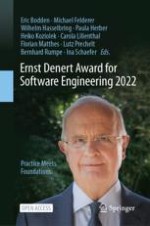This open access book provides an overview of the dissertations of the five nominees for the Ernst Denert Award for Software Engineering in 2022. The prize, kindly sponsored by the Gerlind & Ernst Denert Stiftung, is awarded for excellent work within the discipline of Software Engineering, which includes methods, tools and procedures for better and efficient development of high quality software. An essential requirement for the nominated work is its applicability and usability in industrial practice.
The book contains five papers that describe the works by Jannik Fischbach (Netlight Consulting GmbH and fortiss GmbH), who won the award, entitled Conditional Statements in Requirements Artifacts: Logical Interpretation, Use Cases for Automated Software Engineering, and Fine-Grained Extraction, Christian Kirchhof's (RWTH Aachen University) From Design to Reality: An Overview of the MontiThings Ecosystem for Model-Driven IoT Applications, Sven Peldszus's (Ruhr University Bochum) research about Security Compliance in Model-driven Development of Software Systems in Presence of Long-Term Evolution and Variants, Florian Rademacher's (RWTH Aachen University) work on Model-Driven Engineering of Microservice Architectures, and Alexander Trautsch's (University of Passau) Usefulness of Automatic Static Analysis Tools: Evidence from Four Case Studies.
The chapters describe key findings of the respective works, show their relevance and applicability to practice and industrial software engineering projects, and provide additional information and findings that have only been discovered afterwards, e.g. when applying the results in industry. This way, the book is not only interesting to other researchers, but also to industrial software professionals who would like to learn about the application of state-of-the-art methods in their daily work.
